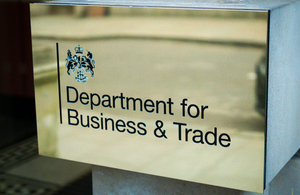Trade Minister visits India and Bangladesh to grow green trade
Minister for International Trade Nigel Huddleston begins a three-day visit to India and Bangladesh

-
International Trade Minister Nigel Huddleston visits Kolkata, India, and Dhaka, Bangladesh, to unveil new initiatives to help UK business sell to both countries
-
He will announce a package of partnerships on electric mobility and green construction at a joint session with Government of West Bengal.
-
UK trade with both countries climbed last year, up 50% in current prices with Bangladesh and 45% with India
Minister for International Trade Nigel Huddleston will today [3 July] kick off a three-day visit to Kolkata in India and Dhaka in Bangladesh focused on unlocking more opportunities for British companies to grow trade and win business.
There are huge opportunities for British companies to take advantage of the growing trade relationships between the UK and both India and Bangladesh.
Bilateral trade with India has already topped £36 billion, supporting half a million jobs across both countries. As part of its ambition to double bilateral trade by 2030, the UK is also continuing to negotiate a trade deal with India. With Bangladesh, trade has increased 50% in current prices, reaching nearly £5 billion.
Minister for International Trade Nigel Huddleston said:
The UK has a strong and enduring relationship with India and Bangladesh. Our trade with both has grown significantly over the past year, which shows our partnerships are reaching new heights.
I want to use my first official visit here to show the UK’s eagerness to work with both countries on shared challenges like climate change, using our collective expertise to deepen our trading relationship, spark economic growth, and create jobs.
Transport is the third biggest source of emissions in India, with road transport accounting for 90% of transport emissions. India has set strong targets to boost electric vehicles (EVs) and the UK is well-placed to support this ambition by providing knowledge exchange, access to finance and technology.
The Minister will announce a new project that will see the UK and Government of West Bengal join forces on a pilot to develop electric two-wheelers, such as motorcycles or scooters.
Huddleston will also launch a centre to enhance opportunities in the EV sector by partnering Indian businesses with elite academic and industrial institutions in the UK.
West Bengal – the sixth largest state by economic value in India, with a GDP expected to reach £117 million this year - has set a target of developing 1 million electric vehicles in the next five years.
Alongside this, he will also facilitate the signing of MoU between the Royal Institute of Chartered Surveyors (RICS) and Government of West Bengal on skill development in sustainable and modern methods of construction. Through these three initiatives, UK businesses will be well-placed to customise and market EV technology and sustainable construction for this burgeoning market in India.
Huddleston will also visit a waste processing company in Kolkata using cutting-edge green technologies supplied by UK business CDE Ireland to recycle construction waste into high quality, reusable sand.
At a business roundtable, the Minister will speak to industry leaders on the deepening of UK and India’s economic ties - emphasising the opportunities that have already been unlocked from the UK-India Enhanced Trade Partnership. The Minister will also discuss the economic benefits of a UK-India trade deal, currently being negotiated, that could cut red tape, reduce tariffs, and help UK and Indian companies do businesses.
In Dhaka, Minister Huddleston will visit Intertek, a UK company supporting supply chains in Bangladesh by providing bespoke testing services, for example ensuring manufacturers meet product safety standards.
This visit comes a month after the UK’s world-leading Developing Countries Trading Scheme (DCTS) came into force making it easier for Bangladesh and other developing countries to trade with the UK.
Bangladeshi exporters now benefit from simpler and more generous Rules of Origin, which means that they will be able to produce goods using components from many more countries and still export these with zero tariffs to the UK.